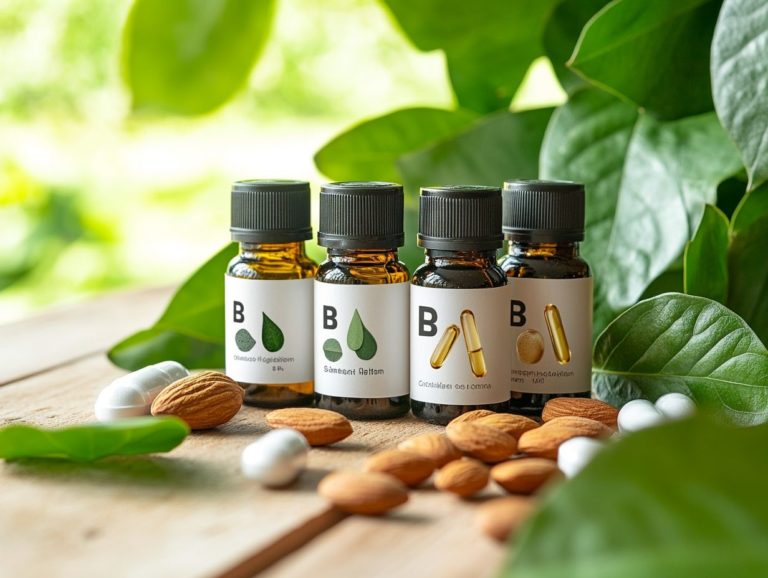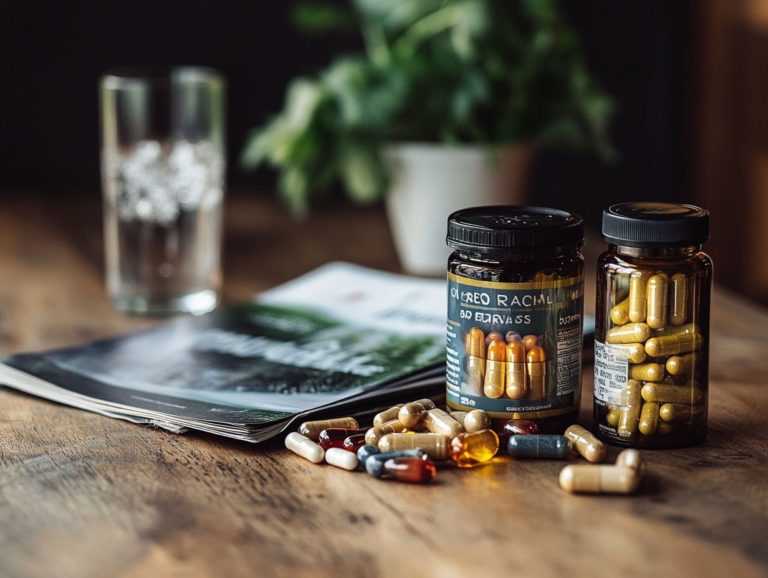5 Dietary Supplements to Support Digestive Health
Digestive health is essential to your overall well-being. You may encounter common issues such as bloating, gas, and irregularity. Fortunately, dietary supplements can provide the relief and support you need.
This article delves into five key supplements probiotics, digestive enzymes, fiber, ginger, and peppermint that can significantly enhance your digestive health. It highlights the common digestive challenges these supplements can address, their specific benefits, and practical ways to seamlessly incorporate them into your daily routine, all while being mindful of potential risks.
Discover how these natural solutions can dramatically change your digestive health for the better!
Contents
- Key Benefits of Supplements:
- 1. Probiotics
- 2. Digestive Enzymes
- 3. Fiber Supplements
- 4. Ginger
- 5. Peppermint
- What Are Dietary Supplements and How Do They Support Digestive Health?
- What Are Common Digestive Issues That Can Be Helped by Supplements?
- How Do Probiotics Help with Digestive Health?
- What Types of Digestive Enzymes Are Beneficial?
- How Does Fiber Help with Digestive Health?
- What Are the Benefits of Ginger for Digestive Health?
- How Does Peppermint Aid in Digestive Health?
- What Are Some Other Helpful Supplements for Digestive Health?
- How Can One Incorporate These Supplements into Their Diet?
- Are There Any Risks or Side Effects to Taking Digestive Supplements?
- Frequently Asked Questions
Key Benefits of Supplements:

- Probiotics improve digestion, reduce bloating, and boost immunity.
- Digestive enzymes ease symptoms of conditions like irritable bowel syndrome and lactose intolerance.
- Fiber supplements regulate bowel movements and enhance gut health.
1. Probiotics
Probiotics are essential for promoting your gut health and enhancing digestive function. These beneficial microorganisms maintain the balance of the community of bacteria in your digestive system that helps with digestion and support your immune health. They ultimately influence the gut-brain axis and your overall well-being.
You ll find these microorganisms in various strains, such as Lactobacillus and Bifidobacterium, which are renowned for their effectiveness in alleviating digestive disorders like IBS and inflammation. Experts like Neil Paulvin, D.O. stress the importance of selecting high-quality probiotic products. Options like HUM Nutrition Gut Instinct and Ritual Synbiotic+ are specifically formulated to deliver the right strains in effective doses, ensuring you receive maximum benefits.
Probiotics also boost the production of beneficial fats that support gut health, crucial for maintaining gut integrity and reducing inflammation. Their balanced contribution to digestion makes them critical for sustaining a vibrant and resilient gut microbiome.
2. Digestive Enzymes
Digestive enzymes are fundamental in breaking down food into essential nutrients and facilitating metabolism. They may also ease symptoms linked to autoimmune diseases, fostering overall digestive health.
These enzymes play a pivotal role in the digestive process. Various types, such as proteases that target proteins, lipases that focus on fats, and amylases that convert carbohydrates into sugars, enhance nutrient absorption in your body. When enzyme levels fall short or become dysfunctional, you may experience malabsorption and nutritional deficiencies.
Your metabolism relies on proper enzymatic function, which can profoundly influence your overall health. For individuals grappling with autoimmune diseases, enzyme support can be especially advantageous, as it may enhance digestion and help reduce inflammation, ultimately leading to improved wellness.
3. Fiber Supplements
Fiber supplements, such as psyllium fiber and artichoke, play a crucial role in promoting your digestive health and enhancing your immune system. They facilitate regular bowel movements and support a balanced gut microbiota.
Among the various options, products like Konsyl Organic Psyllium stand out for their ability to absorb water and form a gel-like substance in your gut. This not only helps to soften stools but also eases their transit through your digestive tract.
Spectrum Essentials Flaxseed is another excellent choice, rich in both soluble and insoluble fiber. It aids digestion while providing essential Omega-3 fatty acids, which can help reduce inflammation and support heart health.
By incorporating these supplements into your daily routine, you can experience improved bowel regularity, reduced bloating, and an overall sense of well-being. Fiber is an essential component of a balanced lifestyle.
Start incorporating these supplements today and feel the difference in your digestive health!
4. Ginger
Ginger stands out as a remarkable herbal remedy that promotes digestive health and supports your metabolism. It helps ease digestive discomfort while enhancing nutrient absorption.
This versatile root can be enjoyed in numerous forms fresh, dried, or even as a comforting tea. Fresh ginger is packed with powerful compounds known as gingerols. Studies have shown these compounds can effectively reduce nausea and bloating. Dried ginger, on the other hand, boasts a more robust flavor and can elevate your culinary creations while stimulating digestion.
Ginger tea is also excellent for addressing gastrointestinal issues. Scientific research backs these claims, showcasing ginger’s ability to improve how well food moves through your digestive system and reduce inflammation.
Add fresh slices of ginger to your smoothies, mix dried ginger into your baked goods, or enjoy a warm cup of ginger tea after meals to support your digestive well-being!
5. Peppermint

Peppermint oil is widely celebrated for its soothing properties, particularly when promoting digestive health. If you want to alleviate symptoms of irritable bowel syndrome (IBS) and enhance overall gut comfort, this essential oil might be just what you need.
It works through several mechanisms, primarily by relaxing the muscles of your digestive system. This can help ease cramping and abdominal pain often associated with IBS. The menthol content in peppermint oil can also assist in reducing bloating and gas, making your digestive process much more comfortable.
Included in many herbal remedies, peppermint oil has caught the attention of clinical studies, suggesting its effectiveness in managing IBS symptoms as a natural alternative to conventional medications. Its reputation as a gentle yet powerful digestive aid highlights the increasing interest in exploring herbal solutions for digestive wellness.
What Are Dietary Supplements and How Do They Support Digestive Health?
Dietary supplements encompass a diverse array of products, from probiotics and digestive enzymes to fiber supplements. These are carefully made to enhance your nutrition, strengthen your immune system, and ultimately improve your overall well-being.
Each of these supplements serves a unique purpose: probiotics introduce beneficial bacteria to encourage a balanced gut flora. Digestive enzymes assist your body in efficiently breaking down food, alleviating discomfort like bloating and gas. Fiber supplements promote regular bowel movements and help maintain a healthy weight by fostering a sense of fullness.
When thoughtfully integrated into a balanced diet, these dietary aids can significantly boost your body s ability to absorb essential nutrients. This leads to heightened energy levels and overall vitality. They not only complement a nutritious diet but also enable you to pursue a healthier lifestyle.
What Are Common Digestive Issues That Can Be Helped by Supplements?
Common digestive issues, like IBS and other gastrointestinal disorders, can often be eased by targeted supplements that provide essential nutrients and compounds to support your digestive health.
These supplements can tackle symptoms such as bloating, gas, and irregular bowel movements, which may arise from imbalances in gut flora or enzyme deficiencies. Probiotics introduce beneficial bacteria into your gut, promoting a healthier microbiome and helping to alleviate discomfort linked to digestive disturbances. Digestive enzymes enhance the breakdown of food, leading to more efficient nutrient absorption and minimizing symptoms of indigestion.
By integrating these supplements into your routine, you can take a tailored approach to managing your digestive health. Start your journey to better digestive health today by trying out these amazing supplements!
How Do Probiotics Help with Digestive Health?
Probiotics play a vital role in your digestive health by restoring balance to your gut microbiome, enhancing your immune system, and aiding in food digestion. These benefits contribute to your overall wellness.
Good bacteria help fight bad bacteria for resources, produce antimicrobial compounds, and modulate your immune response. You can find probiotics in a variety of fermented foods like yogurt, kefir, sauerkraut, and kimchi, as well as in dietary supplements.
Research shows that different strains of probiotics, such as Lactobacillus and Bifidobacterium, offer distinct benefits. For example, Lactobacillus can ease symptoms of lactose intolerance, while Bifidobacterium is linked to better gut barrier function.
Experts emphasize incorporating a diverse array of probiotic strains into your diet to potentially enhance health outcomes. These strains can help reduce gut-related issues and promote mental well-being. Don’t miss out on these health benefits!
What Types of Digestive Enzymes Are Beneficial?
Various types of digestive enzymes like proteases, lipases, and amylases are essential for breaking down food components. This supports your metabolism and overall nutrition while possibly alleviating symptoms of autoimmune diseases.
These enzymes work to dismantle proteins, fats, and carbohydrates into amino acids, fatty acids, and simple sugars. This breakdown is crucial for nutrient absorption and energy production.
Incorporating enzyme-rich foods such as pineapples, papayas, and fermented products like yogurt and kimchi can enhance your digestive efficiency. Consider enzyme supplements if you experience digestive discomfort, as they can provide necessary support.
How Does Fiber Help with Digestive Health?

Fiber is crucial for digestive health, with psyllium fiber particularly effective at regulating bowel movements, preventing constipation, and supporting gut wellness.
You ll find different types of fiber, each offering unique advantages. Soluble fiber, found in oats and beans, helps lower cholesterol levels and stabilize blood sugar. In contrast, insoluble fiber, abundant in whole grains and vegetables, adds bulk to your digestive tract.
Boost your fiber intake by incorporating more fruits, vegetables, legumes, and whole grains into your meals. Exploring fiber supplements might also ensure you’re meeting your daily fiber needs.
What Are the Benefits of Ginger for Digestive Health?
Ginger offers numerous benefits for digestive health, including its ability to reduce nausea, alleviate discomfort, and boost metabolism. It’s a valuable herbal remedy worth incorporating into your diet.
Scientific studies support these claims, highlighting ginger’s active compounds, such as gingerol and shogaol, which have healing properties in the gastrointestinal tract. Consuming ginger can stimulate digestive enzyme secretion, enhancing nutrient absorption.
In the kitchen, ginger enhances dishes from zesty stir-fries to delightful desserts while providing health benefits. As a dietary supplement, ginger is available in capsules, teas, and extracts, making it easy to add to your daily routine.
Share your experiences with probiotics or fiber in the comments below, and let’s build a community focused on digestive health!
How Does Peppermint Aid in Digestive Health?
Peppermint, especially in its oil form, is well-regarded for its soothing effects on the digestive system. This makes it a valuable ally in relieving symptoms of irritable bowel syndrome (IBS) and enhancing overall digestive comfort.
Its versatility shines through in peppermint tea, which many enjoy not just for its refreshing flavor but also for its potential health benefits. Research has shown that both peppermint oil and tea can help relax the muscles of the digestive system, effectively relieving discomfort like bloating and gas.
A study published in the Journal of Gastroenterology revealed how peppermint extracts can improve gut motility. This suggests a promising pathway for those exploring natural remedies for digestive issues. In essence, incorporating peppermint in its various forms may support a balanced digestive system, providing relief through both its delightful aroma and consumption.
What Are Some Other Helpful Supplements for Digestive Health?
Along with probiotics, which are good bacteria that help your gut, and digestive enzymes, supplements like vitamin D, vitamin C, butyrate, and glutamine can significantly enhance your digestive health. These nutrients provide support in various ways, from improving nutrient absorption to reducing inflammation.
Vitamin D is vital for immune function and helps regulate your gut microbiome, enhancing overall digestive wellness. Meanwhile, vitamin C stands out with its antioxidant properties, protecting your digestive tract from oxidative stress and aiding in the absorption of iron from plant-based sources.
Butyrate, a short-chain fatty acid produced during fiber fermentation, plays a crucial role in maintaining a healthy gut lining. It can also help alleviate symptoms of irritable bowel syndrome. Glutamine serves as a primary fuel source for the cells lining your intestines, promoting repair and preserving gut integrity.
To enjoy these benefits, consider the following strategies:
- Take vitamin D and vitamin C supplements after meals to boost absorption.
- Incorporate sources of butyrate by enjoying fermented foods.
- Opt for glutamine in powder form, mixed into your morning smoothies or beverages.
How Can One Incorporate These Supplements into Their Diet?
Incorporating dietary supplements into your diet can be a smooth journey when approached gradually. This allows you to maintain nutritional balance while effectively addressing specific digestive health needs.
To begin, think about blending a probiotic powder into your morning smoothie, loaded with fruits and greens. This can really enhance your gut flora. For snacks, consider mixing fiber supplements into oatmeal or yogurt; it adds bulk and promotes regularity without significantly affecting the flavors. You might also want to tuck a digestive enzyme capsule into your evening meals perhaps nestled in a homemade vegetable stir-fry to aid digestion.
These strategies allow you to weave supplements into your meals seamlessly, supporting your overall digestive well-being without any fuss.
Are There Any Risks or Side Effects to Taking Digestive Supplements?

While dietary supplements can offer a wealth of benefits for your digestive health, it’s essential to be mindful of the potential risks and side effects that may accompany their use, especially when taken in excess or without professional guidance.
You might be surprised to learn that common side effects can include gastrointestinal discomfort, such as bloating, gas, or diarrhea, along with more serious reactions like allergic responses. Some supplements can also interact with prescription medications, intensifying their effects or causing adverse reactions. Therefore, it’s crucial to have a discussion with healthcare professionals who can provide tailored advice before starting a new supplement regimen.
By taking this proactive approach, you can ensure that the supplements fit seamlessly into your overall health strategy and steer clear of any unintended complications.
Frequently Asked Questions
What are 5 dietary supplements that can support digestive health?
The five dietary supplements that can support digestive health are probiotics, digestive enzymes, fiber, omega-3 fatty acids, and ginger, among other essential herbs.
How do probiotics support digestive health?
Probiotics are tiny living things that help balance the good bacteria in your gut. They play a vital role in digestion and can also boost your immune system.
What are the benefits of taking digestive enzymes?
Digestive enzymes break down food and help your body absorb nutrients. They also ease bloating, gas, and indigestion symptoms.
Why is fiber important for digestive health?
Fiber promotes regular bowel movements and keeps you feeling full. It also improves the balance of gut bacteria and lowers the risk of digestive disorders.
How do omega-3 fatty acids benefit digestive health?
Omega-3 fatty acids reduce inflammation and ease symptoms of conditions like Crohn’s disease. They support gut health and may enhance digestion.
Can ginger improve digestive health?
Yes! Ginger is known for its anti-inflammatory and anti-nausea effects. It helps relieve indigestion and bloating symptoms effectively.






